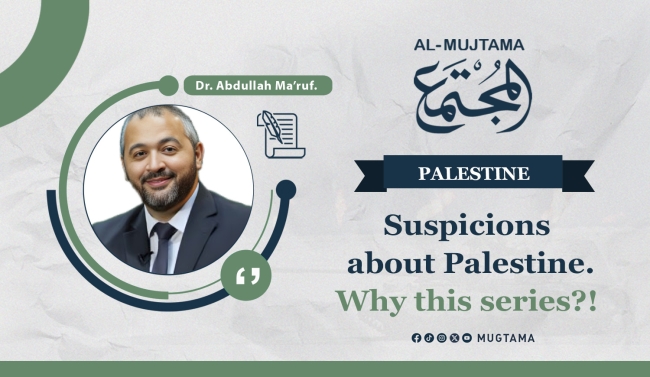Suspicions about Palestine. Why this series?!
Every now and then, some voices that align with Zionist thinking emerge, even if some of these voices speak in our tongue and come from within our own people. They raise doubts that attempt to shake our relationship with Palestine, Jerusalem, and the blessed Al-Aqsa Mosque, trying to assert that this land is not sacred to us and that our nation has erred in defining its deep connection to this land over the course of fourteen centuries. Now, some of the intellectual giants of our time come to "correct" the historical mistake that has lasted for hundreds of thousands, if not millions, of minds for over one thousand and four hundred years!
In mid-2020, the website "Raseef22" published an article by Egyptian writer Mohamed Wahba titled "Is the Al-Aqsa Mosque the same as the Jewish Temple?" This article sparked a whirlwind of reactions due to the large number of names and sources that the writer relied on to assert that the original structure of the blessed Al-Aqsa Mosque is what is known as the "Temple," attributed to the Jewish religion. Some messages reached me regarding this matter, indicating the necessity of having a reference material that examines such doubts, their nature, and the strength or weaknesses of their arguments.
Honestly, when I read the article, I did not discern the reason for the uproar it caused. Responding to each point made in it seemed to me a straightforward matter, were it not for one of my esteemed friends pointing out that these responses may be clear to those well-versed in the field, but they might confuse many non-specialists and non-readers, especially when the writing is directed in predetermined ways and is crafted in a manner that misleads the less knowledgeable reader into believing it is scientific.
Based on that, I intend in this series to refer to some of these doubts that you find scattered across the pages of the Internet and newspapers by individuals, some of whom are academic while others pretend to be academic when they are merely writers, literary figures, or journalists.
The most beautiful responses to these doubts will begin within this series, with God's permission, the Lord of the worlds.
Although it is customary for academics not to pay attention to the thesis of non-academics, I have chosen here to respond to some individuals whose writings, meetings, or lectures readers may confuse with academic and scientific content due to the way the person presents their material to the public. An example of this is the Egyptian writer Youssef Zidane, who, in 2015, appeared on Egyptian media to attack the history of Jerusalem, its Islamic significance, and the identity of the blessed Al-Aqsa Mosque, as well as to criticize Salah al-Din and the history of our nation.
Or some politicians, such as Israeli Prime Minister Benjamin Netanyahu, who has repeatedly come out with historical claims and propositions in his populist political speeches.
This is in addition to researching and responding to academics such as Amnon Cohen, Daniel Sahas, Shelomo Dov Guitein, Ofer Livni Kafri, Hava Lazarur -Yafeh, and others in accordance with what is customary in the academic scientific community.
In each article, we will address a specific doubt raised by some and respond to it with a simplified and easy rebuttal that illustrates its weakness and fallacy, with God's permission. We will also discover how profoundly meaningful this land is in our history, beliefs, and concepts.
Palestine, no matter how some may claim otherwise, has held great significance throughout Islamic history. This importance began to take root from the very moment the Prophet Muhammad (peace be upon him) prayed facing the Al-Aqsa Mosque, and it continued throughout his life. It was further highlighted by Abu Bakr Al-Siddiq (may Allah be pleased with him), the successor of the Messenger of Allah, and the Commander of the Faithful, Umar ibn Al-Khattab, with the conquests of Palestine. The caliphs, princes, and leaders established the profound connection of this nation to this blessed land, from Muawiya ibn Abi Sufyan (may Allah be pleased with him) to Abdul Malik ibn Marwan, Al-Walid ibn Abdul Malik, and all the way to Abu Ja'far Al-Mansur and Al-Ma'mun.
Then Saladin established this truth by liberating this land, and the competition among kings to highlight its significance continued from the Mamluks to the Ottomans and up to today under occupation.
This series will address some of the ideas that the occupier Zionists and the Zionists of our nation alike try to use to change these facts, so that our relationship with this land is based on a solid foundation that does not waver due to the claims of one or the lies of another.


